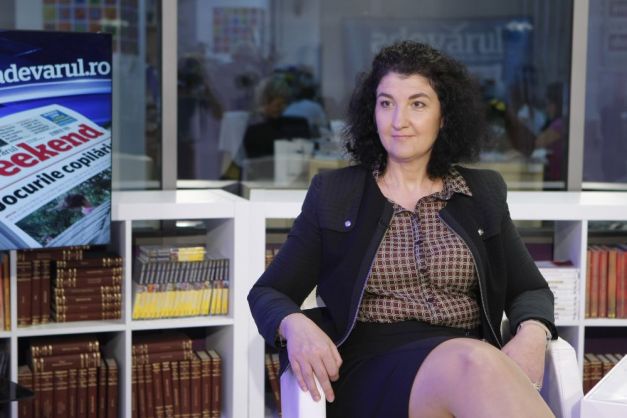INTERVIEW with the psychologist Raluca Nica, the Romanian League for Mental Health: „Any patient suffering from diabetes may develop a depression, as a potential complication“

1.000 family doctors and primary care nurses will be trained in order to enable them efficiently manage the mental health disorders of their patients. Psych. Raluca Nica, the Executive Manager of the Romanian League for Mental Health, told us about the experiences of family doctors in Romania, as well as about what our family doctors need to undertake in order to successfully treat their patients.
The family doctors will be trained in the treatment of mild mental health disorders. Why is this approach effective?
Primary care is one of the main components of the “Support for the reform of mental health services in Moldova” Project. It is a paramount component, because the first person whom a patient gets in contact with in the whole medical system is the family doctor who can either treat the patient, or refer him/her to a specialist, depending on the disease severity. These trainings are intended to help the family doctors of Moldova in making accurate diagnoses of the mental health disorders of their patients, which might manifest either solely or in comorbidity with other somatic problems. This will be helpful for us, because a mental health disorder as a co-morbidity of a somatic disease complicates the situation, worsens the process of cure and sometimes can even delay it or cause some inexplicable symptoms. Therefore, we are careful while addressing such matters, because they can add rather high costs that can be avoided.
How is a mental health treatment different, compared to other treatments prescribed by a family doctor?
Such a treatment is not a typical one. It needs to be maintained for a long period of time. It usually gives results after two or three weeks. As soon as the patients feel better, they use to think that the problem is over and stop the treatment. From the financial perspective, such a behaviour augments the costs we bear.
How can the family doctor further help?
There are multiple approaches available for family doctors. After the successful completion of training sessions, they will be capable to make the early diagnosis of mental health disorders, such as the psychosis, and to refer the patients to the secondary or tertiary health care services. Obviously, the sooner the mental health problem is detected and treated, the better is the long-term remission prognosis.
Could we compare the family doctors from Romania and Moldova from the perspective of approaches to mental health issues?
In fact, family doctors are not used to work with mental health patients. In Romania, they do not have the right to prescribe antidepressants and antipsychotics. Therefore, they usually refer to a specialist the patients in whom they suspect a diagnosis. Sadly, as a result of the stigma attached to specialised psychiatric services, not all the patients reach these services. Thus, the patient neither comes back to the family doctor, nor goes to a mental health specialist. We somehow lose him/her on the way. Consequently, in an acute situation, the patient will reach the tertiary care services, that is the hospital.
Can we assume that, due to dedicated training courses provided by Trimbos, the Moldovan family doctors will be a step ahead of their Romanian counterparts?
They already are, if we take into account that the Moldovan family doctors are entitled to prescribe antidepressants. To what extent they do it, we cannot tell it now. Considering the discussions I had with family doctors, they usually avoid treating the mental health patients. Regardless of the severity of the case, mild, moderate or severe, they still refer such beneficiaries to secondary or tertiary health care services. We wish this routine would diminish, because it is obvious that these services have greater costs than primary care.
With this idea in mind, the greatest cohort of training beneficiaries will consist of family doctors and primary care nurses, in order to teach them how to faster recognize the psychic disorders and treat them, if appropriate. A total number of 1.000 professionals will be trained.
What difficulties might the family doctors face in their endeavours to adjust to the new working methodology?
It is not easy to feel comfortable working following a new set of standards that seem unapproachable at the beginning. Yet if family doctors are informed about the depression, the anxiety or autism in children, which are frequent disorders from the perspective of the international prevalence, they will understand that a lot of their patients are already facing such problems. Any patient suffering from diabetes can develop a depression, as a potential complication. I strongly hope that they will become able to identify in their families, as well as among their acquaintances the persons who need support for their psychic disorders, which can be mild, moderate and rarely severe. Moreover, they can be treated with new medication with a good action.
The reform of mental health services is targeted at improving the wellbeing of the users of mental health services, by providing them access to community mental health services, closer to their home.
The reform is based on multidisciplinary home support services and the outreach of mental health services, provided by a committed team of professionals. This kind of treatment combines the modern healthcare services with the social services, for the sake of the client’s full reintegration into the society.
The ”Support for Mental Health Services Reform in Moldova” Project is implemented by TRIMBOS Institute (The Netherlands Institute of Mental Health and Addiction), with the financial support of the Swiss Development and Cooperation Agency.
